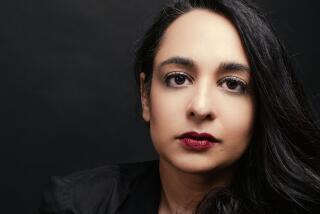Review: ‘American Dervish’: A Muslim boy grows up in the Midwest
- Share via
After countless years spent memorizing the Koran and subscribing to most anything that might make him more Muslim, Pakistani American college student Hayat Shah finally finds enlightenment — in the form of a pork bratwurst.
“I lifted the sausage to my mouth, closed my eyes, and took a bite,” recalls Hayat in the prologue of “American Dervish,” Ayad Akhtar’s debut novel. “My heart raced as I chewed, my mouth filling with a sweet and smoky, lightly pungent taste that seemed utterly remarkable — perhaps all the more for having been so long forbidden. I felt all at once brave and ridiculous. And as I swallowed, an eerie stillness came over me.
“I looked up at the ceiling.
“It was still there. Not an inch closer to falling in.”
Akhtar’s beautifully written coming-of-age novel follows Hayat, the only child of immigrants, through the confusion of pre-pubescent boyhood and the trials that a mixed cultural identity brings. Growing up in the rural-westerly suburbs of 1980’s Milwaukee, he is systematically shunned, verbally abused and openly ridiculed for his faith — and that’s all before stepping out of his dysfunctional home and into his largely Anglo, Christian surroundings.
The boy’s marginally religious mother is too preoccupied trying to catch her philandering husband’s attention to notice her son’s growing alienation (“Give a Muslim man a drink and watch him run after white women like a crazed fool!”) while his defiantly secular father is too busy cheating, drinking and wallowing in his own cynicism to pay his introverted son much attention beyond the occasional lecture about religion (“Did you ever meet a man of God who loved God half as much as he loved money?”)
But an attentive house guest from Karachi turns his life around when she brings faith and love into the Shah home. Mina Ali spends hours telling him moving stories from the Koran, captivating him with colorful tales about Sufi whirling dervishes, the angel Gabriel and the prophet Muhammad’s childhood. His emerging spirituality is intertwined, and fed, with his growing crush on Mina.
“Allah will always forgive you, no matter what you do,” she tells him during one of their talks. “You are safe. As safe as if Allah Himself were holding you in the palm of his hand,” he writes. “She put out her palm, its narrow, waxen surface glowing above a network of crisscrossing lines. Like the page — and her fingers on it earlier — her hand struck me as startling, vivid, breathing with life. She kissed me on the forehead again. ‘Allah be with you, behta.’ ”
But when Mina begins dating a non-Muslim (a Jew, no less) and Hayat’s sessions with her dwindle, his jealousy and rage get the best of him. Instead of turning to other tried and true American teen afflictions — drugs, gang violence, dressing like Boy George — he learns from other Muslims around him how to twist the faith to serve his less noble intentions. Enter Islamic extremism.
After we’re away from Mina, it’s nearly impossible to find one other redeemable character in the Indo-Pak community of Muslims around them. From the Islamic Center to the wedding hall, their fellow worshipers are like characters from a Herman Cain speech — fanatical, under-evolved, sheep-like, anti-Semitic, abusive toward women and willfully unassimilated. It’s such a shift from the complex characters inside the Shah home that the story line suffers after it sinks into the one-dimensional world outside their door.
In press material accompanying the book, Akhtar said he wrote “American Dervish” because he wanted to “open a window on the vibrant and complex world of Islam in the country” but couldn’t without also “exposing some of the more painful aspects of my life in Muslim America.”
He does this beautifully, half of the time, deftly illuminating the age-old struggle of separating spirituality from dogma, faith from cultural baggage and pure intent from political agenda.
If only he had enough faith in readers to present Hayat and Mina’s complex relationship with their religion — and the world around them — as something other than exceptional, he might have achieved a first in American literature.
More to Read
Sign up for our Book Club newsletter
Get the latest news, events and more from the Los Angeles Times Book Club, and help us get L.A. reading and talking.
You may occasionally receive promotional content from the Los Angeles Times.











